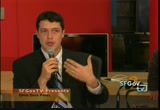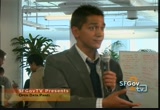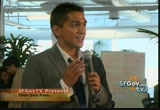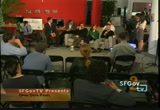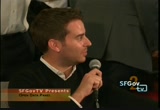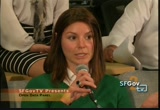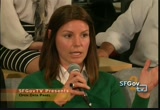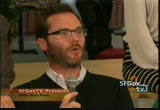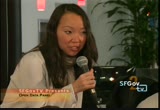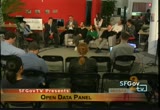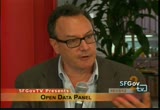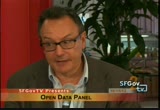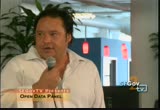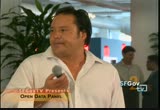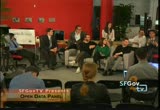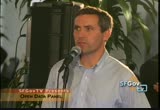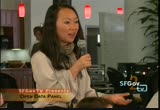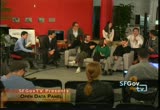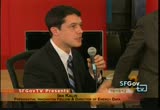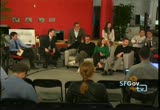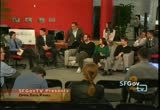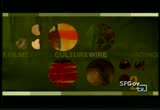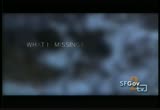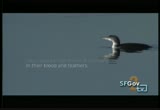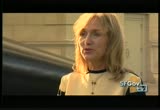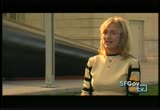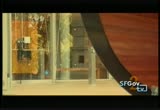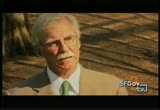tv [untitled] November 17, 2012 7:30pm-8:00pm PST
7:30 pm
industrial scale. that is one data set. to your other question about what is the federal government doing, we're seeking not just an energy, but across the government to engage entrepreneurs and innovators across all the different sectors. for those of you familiar with the history of the health data initiative launched by then the hhs health and human services chief technology officer todd park, we sought to have a health data palooza proceeded by health data jambs or modeling sessions, jams sounded more fun, we can invite entrepreneurs in and see what can be done and created real products within a few months. that is being rolled out at education, energy, treasury, u.s. aid, other agencies as well. these programs are celebrating the use of open data and hopefully will provide some additional support. i think there are even folks here who have been part of these events. we're excited for that continued support and hope you can all join this initiative in the neutral. -- future. >> so, earlier you were talking
7:31 pm
a little about kind of how san francisco came in in terms of actually ading the officer. more broadly how do you think san francisco compares and what are some of the other cities that are doing really well in terms of open data? >> i should be clear. when san francisco is third, we have a pact. i'll add to that actually. what's great in san francisco is there is not just going to be a chief data officer. there is also the office of civic innovation. jay's team, shannon's team. by having both of those units in place i think there is going to be a really powerful team. because you can't just open up the data. you have to do things like this, where you get the community together or you have people actually talking about it because the demand side, as we were talking about it, will be there because there is going to be someone there. there have to be people working with it who are getting out there. i think this is what this city is going to be really powerful. in terms of other cities doing as well, chicago is doing some really interesting stuff. scary cool stuff.
7:32 pm
they're taking 3 in 1 data, pothole request and crime report and matching it up with social media. they're getting this really deep and rich picture of what is going on in the city. and you can do that with data when you think about it creatively. philadelphia as i mentioned, they are really active in open data. and new york, again with 3 in 1 is doing smart analytics. i think that's what you'll see happening as well, government starts to become smarter, make better decisions, better policies. this term algorithmic regulation, which means you can have laws and policies in the cities determined by data and not just what we think is best, but what's actually best. so, as cities keep catching on and more and more with the data, you're going to see some really interesting things coming out. >> cool. while we're talking about data, another part of the announcement today was also motion loft making private data available within sort of that initiative and that website wrieri'd like to hear a little more, john, about kind of
7:33 pm
deciding to share that data with the city and also a lot of times especially with other companies you see them being very protective of their data. there is a lot of value there. how do you sort of balance, protecting the value of your data and commercial viability versus making it available to the public? >> so, we have a unique problem, i think, to a lot of start-ups in the fact that we have a product that we sell and a lot of different vertical. we also have data we want to provide to the society at large. and how do we not step on our own toes and give away our own data and make the company worthless. so, it's tough. it's a definite fine line between the two. today we announced that we're going to give crowding data to the city so you'll know where crowds are in the city and when they occur and where they occur. and that really isn't commercially viable for us. so, something we can provide to
7:34 pm
the city without any repercussions financially, which is great. we want to do more of those things. i made the decision to release this data about three minutes before a speech that i gave at spur a couple weeks ago. and literally, yeah, i was committed obviously, jay took me up the second i said t we have to go talk now. okay. so, jay walked it down. i think jay is great for partnering with start-ups as much as he does. >> great. who can be the other start-ups, people using the data to make products. you already talked about what you actually made. i'd love to hear more about the experience of working with the city's data like, you know, other things, like services or data points you would actually like -- would make it better and you can sort of take that. whoever has an answer ready can go first. >> and i have a microphone.
7:35 pm
i wanted to say this earlier and it kind of slipped my mind. we have the most amazing experience working with the city over the past just really the few weeks in building this application about urban growth. one at the data portals, it has a rich repository of information. but working with -- we had lots of questions, right. something maybe there were attributes or information that wasn't necessarily documented to the extent we wanted. and we asked the question, we would get these immediate responses with really insightful conversations that would come out of it. i think that type of collaboration is only going to make the portal better. the more people use it the better it's going to get. we also experienced some challenges, you know. we did a lot of work with the data. we did a lot of data, put things together. we did things like added value, added certain locations. and i would love to be able to pull that back up to a shared
7:36 pm
community portal. from what i can tell it wasn't necessarily promoted at this time, but i think there is a lot of value in that. and shannon, interrupt me if i'm speaking -- if that's -- if i'm stating anything that's incorrect. you know, i know that they went through a special process. maybe we make it a little easier, a little more seamless so that anybody is pulling down data and doing things, they can't push it back up. that was one of the things we would love to see. >> probably shouldn't have been in public, but we were very naive about the whole process and we were actually trying to feed content locations around the city. and started to do this and started to think there must be a list out there. there must be a list of every park in san francisco. i would find it in wikipedia. we stumbled into the sf data website and started looking. it was unbelievable, actually. so, some of the data sets we
7:37 pm
really needed were already there in very, very good format. and random things that i would never think of like movie set locations in the city of san francisco or every piece of civic art that was there, just really interesting things all with, you know, latitude-longitude, tags and information about them. it was really interesting. and then in my first meeting, in our first meeting with the innovation group, the city i heard of 10 other things that i clearly should have been using and didn't even know existed, literally within the first 15 minutes of the meeting. ss things like street safety, sidewalk safety scores and quality scores so we could wrap people around places. * route people around places. really unbelievable. we availed ourselves of resources going forward. we had the same -- like any data set, you find great things about it. then there's missing values or is thisxtion that got auto populated. we fixed a lot of things. we fixed a lot of gps coordinates.
7:38 pm
we would love the ability to post that back up * . even if you're not crowd sourcing new things, you can definitely crowd source quality of a data set that way. >> yeah, it's been a really great experience working with 100 plus and motion loft. just to respond, i think that this is a whole new opportunity actually what you're talking about. in addition to reaching out to the private sector to generate more data sets as you just mentioned, there's also the opportunity to have better data sets from the work that you've done, scrubbing them and harmonizing them. i think there is also this really great opportunity to generate whole new types of data sets like motion loft is doing. and i think that this is going to present something kind of
7:39 pm
back to the city, showing where some of our gaps are and hopefully filling in some of those gaps with those data sets. so, i think that there is something about having more city data sets, existing data sets as well as creating new types of data. this is really exciting for us. >> we're going to tell a quick story on how private data can stimulate civic innovation. this summer in singapore, we had about 30 data sets opened p. up. one data set was about a million or so records of taxis all over town. typically taxi data stuff, it's hard to get, private companies, they don't want to open it up competitively. one taxi company at the last minute opened up, motion loft made it efficient to see what would happen. because they contributed to the stuff, we had five separate teams working on could we do collaborative consumption of sharing taxis, build a dash panel for companies to know where to go. had i hatch i had been working
7:40 pm
on a model to see how much overlap there was. they sent us to tokyo to work on that. so, this one set, a million records of where the taxis were not only led to a lot of innovation, but people realized 15% of all taxi routes kind of where people went, about 15% of that was all overlapped. so, a city that never really thought about collaborative consumption or sharing suddenly is looking at that. parking data was opened up similarly about a million records of where people weren't parking and within a couple of days predictive analytic app was written. go to a parking reservation thing. the carrier local phone company released pairs of where people were all over town. a lot of privacy issues. we wrote a contract around that. all of that led to a huge amount of innovation and new forms of thinking. and even as i look at what goes on with teams working in san francisco stuff, the minute for example i saw the esri data that has tons of economics and social behavior behind t i
7:41 pm
realized sometimes you come together and work on something, and lacking that stuff you make assumptions, you make things up. you don't have a rich set of data. the fact there is a place to turn either because it's free or you can go pay for it, but it's kind of normalized and available i think just speeds things up, reduces redundancy and that's going to be the thing that leads it a real burst of innovation and value both financial value for developers, but also civic value for where we live and clearly we're at the very beginning of that. and i think san francisco has been pushing ahead and that's why it's exciting. >> i'm going to give you a chance to talk about his experience in a second. first i'll open it up for questions from the audience in just a second. think of anything you want to ask our many panelists up here. all san franciscans. i'll give the panel to ask each other questions if they want. talk about your experiences working with san francisco. >> sawyer, i could barely here you. >> sure, could you talk a little what your experience is like working with san francisco and, you know, other things that you'd like to see that
7:42 pm
have become available in start-ups that aren't already. * sorry >> so, we started navigating the city of san francisco or working with the city of san francisco close to 2-1/2 years ago after our initial concept. we realized about two years ago we discovered the innovation office. we discovered sf data sets, and we were absolutely delighted to have the resources available to us through these offices. and they really were the driving factor behind our development moving forward. obviously they weren't exactly where we needed them to be at that time, and we had worked with multiple departments now on cleaning up the data sets obviously. and then putting that back out there. one of our biggest pin points or struggles has been with the legislation and the old models of the [inaudible] the regulations and laws which are
7:43 pm
being slowly worked on through the legal departments and the san francisco's legal department. but essentially we found the experience through innovation office has been driving the initiatives through and helping us develop and the data sets have bon become cleaner. they have become easier for us to use and the process has become a lot more efficient. >> school. -- cool. i was told if you have a question you should line up at that microphone right there. if you're coming up -- no, he did youant [speaker not understood]. >> i don't have a question. i wanted to comment on this. i think something else is really unique and maybe one of the untold stories or not told so much stories about the impact of open data is really the companies that are being formed. and as you mentioned earlier,
7:44 pm
they're a sustainable company and this is being powered by open data and motion loft is figuring out how they can share the asset that sort of your business model is built on. so, i think that this is presenting a whole new type of question for sort of apps built with government data or public data. >> i guess i'll jump in once here, too, while people are stepping up. we've been doing this for awhile now. one thing we've learned in this innovation space, people matter. like you can build technology you want, platform you want, that's great. it's the people who are doing it that matter and they're going to get stuff done. this has some of the best people, shannon and jay are doing t. they've been doing it awhile so they know what they're doing. it's great. last year i was building this adopted tree app and i found it on the data portal. it had like some weird geo data like it was in some form i couldn't use. i just dropped jay a note and like within 24 hours i got the
7:45 pm
data fixed and it was perfect. so, it's those kind of relationships that matter and having the right people in place. so, i think the chief data officer, these guys will end up joining a rock star team. >> not a question, but just a comment to say thanks to the city's innovation office. we're a small company from ireland called building i. we take permit data from cities and show it to anyone who wants to see it. we started off in ireland, discovered the san francisco data and came over here and now we've got an office up and running here with san francisco data. so, it's great to be able to do that. just one note of caution of how do you prevent kind of third-party data integrators from owning that data. i think jay was talking about it earlier on. it's just a note of caution for you guys. >> how do we prevent vendors from holding the data? >> yes. >> we're still working on this piece with our legal department.
7:46 pm
we're looking to do and this is very exploratory right now, really looking at the contracting process itself and how we can use that as a mechanism. basically we want to do business with you if you're willing to share your data. as jay mentioned we don't want to be held hostage. we don't want our data to be held hostage to the companies. as we figure this out, we'll continue going about it and providing updates. yeah, i think that there's actually a lot of companies out there that are being powered right now with our open data program. so, if there's any that aren't represented here today, please let us know. we would love to feature you. because this is the other story that i was talking about. open data is demonstrating economic growth and job creation. so, yes, it's about transparency, yes, it's about openness, but it's also about creating jobs and this is a really exciting piece of the story. >> we have another question. >> thanks, everybody, great
7:47 pm
panel, great things going on. i have a question around strategies that you guys are facing to monetize somehow this data. of course, having companies that create applications and then they sell these somehow is fantastic. but is government thinking about ways in which they can directly monetize these data sets? >> can i say one quick thing first? i remember we were at the white house innovation panel and there was this exact conversation came up because we are looking to monetize everything we do. and the city is also looking to monetize this and make revenue. one of the biggest conversation pieces that came out of the talk and some of the questions from the crowd was opening up apis for transactions, permitting, reservations and those type of things, which would be an incredible influx of private industry working with governments and also providing incredible efficiency for the public to be able to make these transactions.
7:48 pm
i'll probably say that ian might want to talk more on this, but that would be something that would be highly encouraged from the private sector and from my company specifically. >> that's a great point. and i'll say the short answer to your question is the federal government is trying to not charge for this data. the way we did was with tax dollars. you already paid for it, we're trying to give it back to you. and, so, we take a wholesale retail. we want to be the providers of the data as a fuel, but fuel, gasoline is useless to get you from point a to point b unless you consume that ultimately drives value to the american economy. our customer, i can completely agree with what shannon said in terms of our business objective, so to speak, is to empower entrepreneurs and innovators, to create jobs. that's a metric of success, not revenue generated per data set or some other per ifervance metric. the other piece of that looking back to the example of weather and gps, my monetization, is that together they contribute
7:49 pm
$100 billion to the american economy last year. last year alone from just those two data liberations. so, that is the way in which we are approaching from a strategy perspective, the ultimate impact to our customers. >> one super quick. one thing the city of san francisco or big cities or federal, right, the other smaller cities, smaller cities have smaller budgets. having a structure to support all this open data takes a lot of money. so, when these small cities are thinking about this, they should think about a way of somehow equalizing because they are putting into having these open data team, right? so, what does make sense? this is kind of an open question to get your point of view. >> do you want to take that, shannon? >> i think that there is actually quite ah few examples. we can probably talk to this more with smaller cities that
7:50 pm
are making open data efforts. but what i would say is that it's proven more than the value of the investment. the return that we've gotten just by opening up the data has actually given back more. so, that would be my short answer to it, but i think you probably have more experience working directly with some of the cities. >> so, i grew up in a small city so i care about small cities a lot, 15,000 people, southern illinois. i'm a card nastionv fan. -- cardinals fan. i should say that. the city of santa cruz, for instance, it's a smaller city. they're a leader in open data. they've been doing this for a long time. the working with the city of make on, georgia, they're doing it as well. * macon. the smaller cities are taking advantage of easily reusable solution thextion, right, so open source technologies that make it easy for them to make a data catalog, and they're bag borrowing and stealing whatever they can from the bigger cities. whenever we get the chief data
7:51 pm
job description up, we should put that online and the city can take that. you can see cities sharing resources so that way even if they don't have the resources themselves, they can work together and pool those resources. >> maybe just to add one more thing to that, when we passed our legislation in 2009, we actually documented and shared our best practices for how we laid forth this program for other cities to use as well. >> great. so, i think we've actually already gone significantly over what i was hoping. i was hoping to [speaker not understood] also. we're going to wrap it up. thanks to all our panelists and the hatchery for hosting us. anything else you need to say before we wrap up? okay, wrap up. (applause) >> >> oh. >> if anyone would like to support the federal open data movement please follow us at twitter project open data all one word, or check us out on data.gov. (applause) >> thanks.
7:52 pm
>> what if you could make a memorial that is more about information and you are never fixed and it can go wherever it wants to go? everyone who has donated to it could use it, host it, share it. >> for quite a great deal of team she was hired in 2005, she struggled with finding the correct and appropriate visual expression. >> it was a bench at one point.
7:53 pm
it was a darkened room at another point. but the theme always was a theme of how do we call people's attention to the issue of speci species extinction. >> many exhibits do make long detailed explanations about species decline and biology of birds and that is very useful for lots of purposes. but i think it is also important to try to pull at the strings inside people. >> missing is not just about specific extinct or endangered species. it is about absence and a more fundamental level of not knowing what we are losing and we need to link species loss to habitat loss and really focuses much on the habitat. >> of course the overall mission of the academy has to do with two really fundamental and
7:54 pm
important questions. one of which is the nature of life. how did we get here? the second is the challenge of sustainability. if we are here how are we going to find a way to stay? these questions resonated very strongly with maya. >> on average a species disappears every 20 minutes. this is the only media work that i have done. i might never do another one because i'm not a media artist per se but i have used the medium because it seemed to be the one that could allow me to convey the sounds and images here. memorials to me are different from artworks. they are artistic, but memorials have a function. >> it is a beautiful scupltural
7:55 pm
objective made with bronze and lined with red wood from water tanks in clear lake. that is the scupltural form that gives expression to maya's project. if you think about a cone or a bull horn, they are used to get the attention of the crowd, often to communicate an important message. this project has a very important message and it is about our earth and what we are losing and what we are missing and what we don't even know is gone. >> so, what is missing is starting with an idea of loss, but in a funny way the shape of this cone is, whether you want to call it like the r.c.a. victor dog, it is listen to the earth and what if we could create a portal that could look at the past, the present and the future? >> you can change what is then missing by changing the software, by changing what is projected and missing. so, missing isn't a static
7:56 pm
installation. it is an installation that is going to grow and change over time. and she has worked to bring all of this information together from laboratory after laboratory including, fortunately, our great fwroup of researche e-- g researchers at the california academy. >> this couldn't have been more site specific to this place and we think just visually in terms of its scupltural form it really holds its own against the architectural largest and grandeur of the building. it is an unusual compelling object. we think it will draw people out on the terrace, they will see the big cone and say what is that. then as they approach the cone tell hear these very unusual sounds that were obtained from the cornell orinthology lab. >> we have the largest recording of birds, mammals, frogs and insects and a huge library of videos. so this is an absolutely perfect
7:57 pm
opportunity for us to team up with a world renown, very creative inspirational artist and put the sounds and sights of the animals that we study into a brand-new context, a context that really allows people to appreciate an esthetic way of the idea that we might live in the world without these sounds or sites. >> in the scientific realm it is shifting baselines. we get used to less and less, diminished expectations of what it was. >> when i came along lobsters six feet long and oysters 12 inches within they days all the oyster beds in new york, manhattan, the harbor would clean the water. so, just getting people to wake up to what was just literally there 200 years ago, 150 years ago. you see the object and say what is that. you come out and hear these
7:58 pm
intriguing sounds, sounds like i have never heard in my life. and then you step closer and you almost have a very intimate experience. >> we could link to different institutions around the globe, maybe one per continent, maybe two or three in this country, then once they are all networked, they begin to communicate with one another and share information. in 2010 the website will launch, but it will be what you would call an informational website and then we are going to try to, by 2011, invite people to add a memory. so in a funny way the member rely grows and there is something organic about how this memorial begins to have legs so to speak. so we don't know quite where it will go but i promise to keep on it 10 years. my goal is to raise awareness and then either protect forests from being cut down or reforest
7:59 pm
in ways that promote biodiversity. >> biodiverse city often argued to be important for the world's human populations because all of the medicinal plants and uses that we can put to it and fiber that it gives us and food that it gives us. while these are vital and important and worth literally hundreds of billions of dollars, the part that we also have to be able to communicate is the more spiritual sense of how important it is that we get to live side by side with all of these forms that have three billion years of history behind them and how tragic it would be not commercially and not in a utilitarian way but an emotio l emotional, psychological, spiritual way if we watch them one by one disappear. >> this is sort of a merger between art and science and advocacy in a funny way getting people to wake unand iz
99 Views
IN COLLECTIONS
SFGTV2: San Francisco Government Television Television Archive
Television Archive  Television Archive News Search Service
Television Archive News Search Service 
Uploaded by TV Archive on

 Live Music Archive
Live Music Archive Librivox Free Audio
Librivox Free Audio Metropolitan Museum
Metropolitan Museum Cleveland Museum of Art
Cleveland Museum of Art Internet Arcade
Internet Arcade Console Living Room
Console Living Room Books to Borrow
Books to Borrow Open Library
Open Library TV News
TV News Understanding 9/11
Understanding 9/11